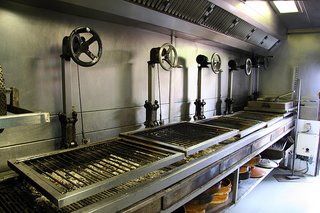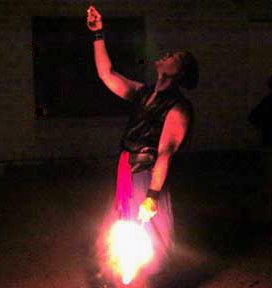8. Quest for Fire
I won’t even get into the fact that in some parts of the country, “barbecue” and “grill” are interchangeable verbs. Not here. Not where I live. Barbecuing is a process of cooking dry-rubbed meat over indirect fire in a long, languid interplay of heat and smoke. Maybe late in the process, a liquid baste is mopped on. Grilling is raw meat (and other things) placed squarely on an oiled grate over raw fire, charcoal- or gas-driven.
The latter issue divides grillers. My
 Gregory was a charcoal man. He was about gathering twigs, scrunching up newspaper, and lighting a starter fire with a single match. He’d blow and poke and stand back and contemplate and poke again until he had a healthy flame churning. With this, he’d ignite charcoal briquettes. Chemical starters were unacceptable.
Gregory was a charcoal man. He was about gathering twigs, scrunching up newspaper, and lighting a starter fire with a single match. He’d blow and poke and stand back and contemplate and poke again until he had a healthy flame churning. With this, he’d ignite charcoal briquettes. Chemical starters were unacceptable.When he lived in Salt Lake City – when his career as an economist was just beginning and before the death of his father would call him home – he used to grill all the time. Even in the howling depths of winter. He didn’t care if there was snow on the ground and it was 20 degrees outside. “It’s never too cold to grill,” he declared.
Mario, on the other hand, is a gas man. He fires up the grill with the turn of a
 knob and the flick of a lighter. He turns out some good grilled food. He is a consummate cook. But – how shall I say? – his grill lacks the smoky nuance that a charcoal fire, with its wood-chip variations and dance of direct-indirect heat, provides. No. Let me go farther. It is a nasty grill. Its grate is caked with char, and the gas flames flare at one end, sputter at the other. Yet Mario, like a surgeon forced to use a Swiss army knife, manages. He even defends his grill.
knob and the flick of a lighter. He turns out some good grilled food. He is a consummate cook. But – how shall I say? – his grill lacks the smoky nuance that a charcoal fire, with its wood-chip variations and dance of direct-indirect heat, provides. No. Let me go farther. It is a nasty grill. Its grate is caked with char, and the gas flames flare at one end, sputter at the other. Yet Mario, like a surgeon forced to use a Swiss army knife, manages. He even defends his grill.Almost every weekend, Gregory would grill at my house, where he kept his
 Weber “Smokey Joe.” Yes, the company spells “smoky” incorrectly. I called the grill Little Joey. Gregory would hunker over the glowing briquettes and wood chips, tending them like a mama duck with her ducklings. He’d take my daughter out on the patio with him and indoctrinate her into the mysteries of monitoring heat and smoke, or flipping meat with tongs. In a heartbeat – there’s that heartbeat again – they would be transported to the mouth of the cave in who-knows-what millennia.
Weber “Smokey Joe.” Yes, the company spells “smoky” incorrectly. I called the grill Little Joey. Gregory would hunker over the glowing briquettes and wood chips, tending them like a mama duck with her ducklings. He’d take my daughter out on the patio with him and indoctrinate her into the mysteries of monitoring heat and smoke, or flipping meat with tongs. In a heartbeat – there’s that heartbeat again – they would be transported to the mouth of the cave in who-knows-what millennia.The amazing thing is, there was a municipal ordinance in my neighborhood against outdoor grills. It was not uncommon for neighbors to call the police if they smelled grill smoke wafting from some clueless newcomer’s patio. It was almost a competition to see who could get to the phone and call the cops on them first. Yet Gregory and I grilled almost every weekend, unimpeded, for five years.
During my time with Mario, I’ve tried to convey the difference a charcoal grill makes. For though I am a woman, I fall squarely in the charcoal camp. I’ve given him wood-chip pans and wood chips, received about as enthusiastically as a do-it-yourself vasectomy kit. I’ve dropped broad hints at restaurants, like, “This mesquite-smoked steak tastes soooo good.” I might as well be petting an armadillo.
 After Gregory died, Little Joey was consigned to a box on a shelf. I just couldn’t bring myself to grill on it, even though I knew how. Besides the emptiness of Gregory not being there, I was sure that the first time I lit up, someone would call the cops and I’d be busted.
After Gregory died, Little Joey was consigned to a box on a shelf. I just couldn’t bring myself to grill on it, even though I knew how. Besides the emptiness of Gregory not being there, I was sure that the first time I lit up, someone would call the cops and I’d be busted.I accepted Mario’s pathetic gas grill as I accepted other aspects of his character that were different from Gregory’s. And indeed, there’s a Calabrian dish Mario makes that requires grilling many slices of eggplant. I’ve seen him spend hours, sweat dripping off his face and chest, hunkered over that grill, achieving just the right balance of soft flesh and char out of those gassy, fickle flames. He combines this eggplant with layers of marinara, a combination of cheeses, hard-boiled eggs and seasonings to create a rustic eggplant parmesan of ambrosial dimensions. It’s hard to argue with his success, despite his limited tool.
 Lately, though, Mario has decided that he needs a new grill. Not only that, he has his eye on a charcoal-fired hottie – a Hasty Bake, which grill cognoscenti will recognize as the Maserati of home units. Am I excited because this will this make him more like Gregory? No! But I am thrilled to see him stretching to explore a new way of playing with fire.
Lately, though, Mario has decided that he needs a new grill. Not only that, he has his eye on a charcoal-fired hottie – a Hasty Bake, which grill cognoscenti will recognize as the Maserati of home units. Am I excited because this will this make him more like Gregory? No! But I am thrilled to see him stretching to explore a new way of playing with fire.Wait. There’s a post script here. I allowed Mario see this entry up to this point before posting. And he was so taken aback and ashamed at what I had written about his gas grill that he spent an entire afternoon refurbishing it, top to bottom. Fixing the element. Cleaning the grate. Making space for a smoker box. Making sure that I would never use adjectives like “pathetic” and “nasty” again. That's the newly refurbished gas grill, up there with the T-bones on it.
Who knew!? He and Gregory share a near obsession with order and cleanliness. For Gregory, that meant expensive shoes lined up in his closet like spit-and-polished little soldiers, all in a row. For Mario, it means turning into the White Tornado every Saturday morning in an orgy of house cleaning.

Mario's idea of the ultimate grill, designed & built by chef
& owner Victor Arguinzoniz, of the renowned Etxebarri.
I guess Mario found my analysis of his nasty, pathetic grill at odds with his pristine, Mr. Clean self-image. Or maybe, the hair on his legs just got a little thicker. Suddenly, he takes his role as keeper of the flame very seriously. That is good. The torch has passed. Somewhere, Gregory is smiling.







